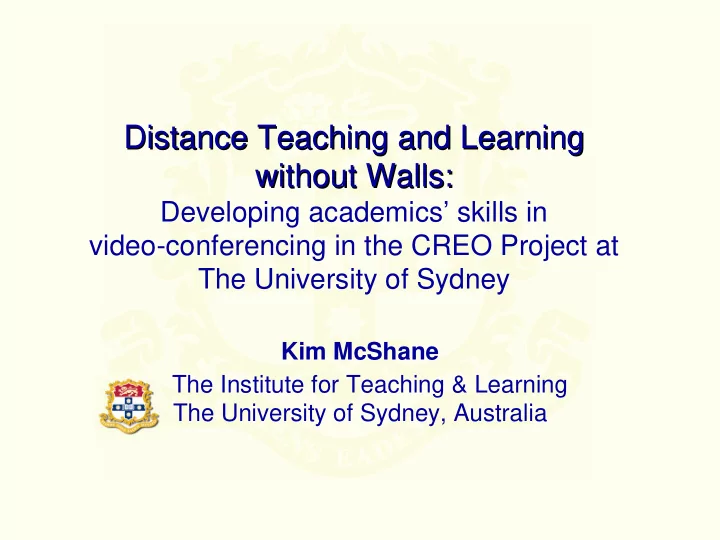

Distance Teaching and Learning Distance Teaching and Learning without Walls: without Walls: Developing academics’ skills in video-conferencing in the CREO Project at The University of Sydney Kim McShane The Institute for Teaching & Learning The University of Sydney, Australia
Background • Orange Campus, The University of Sydney - Faculty of Rural Management: UG & PG - now offering UG courses in Pharmacy, Liberal Studies, Computer Sci. - Sem I 2003: 9 units w/ enrolments: 9 - 49 students • ‘Partnership project’ : the University, the Western Institute of TAFE, the NSW State Department of Education & Training, the Commonwealth Department of Education, Science & Training. ‘Centre for Regional Education, Orange’ = CREO
Teaching and Learning at a Distance • A technology-facilitated curriculum: - video-lecturing - online and print materials - online communication and activities - other: labs, computer-based learning ...plus local tutors ...and lecturers’ visits
Pharmacy Lecture Theatre
Arts Videoconferencing Room Web Link: http://www.artsit.usyd.edu.au/labguides/servicesv cr.htm
Orange Videoconferencing Room
Academic development in video-lecturing • Why a training & development program? • Who would facilitate it...? --> LearnTel http://www.learntel.com.au/ Director LearnTel: Carol Daunt • Survey: The CREO lecturers preferred 2 x half-day Intro. workshops ( ∴ normally a 2 day program!)
Workshops • Structure: 2 x half days, 3 hrs each • Timing: Nov 02, Feb-Mar 03 • Content: - v’conf equipment, systems, add-on equip’t - thinking visually - learning (& teaching) - ‘hands-on’: mini-lessons
The CREO lecturers... • English: 8 History: 2 • Pharmacy: 3 Psychology: 9 + Library: 2 + other staff attended… • 19 / 22 participants indicated very little or no experience of video-conferencing.
Lecturers’ early concerns... …as revealed in brainstorming notes: - How is it different? (vs. chalk ’n’ talk) - How do we interact with remote site? - What about engagement of all students? - Is it user-friendly? - What about technical support? - What will the Uni. get out of it? (!)
Lecturers’ Evaluation Workshop 1 [n = 22] • content: the workshop had met their needs well or very well [20] • relevance: the workshop had met their needs well or very well [20] • presentation: the workshop had met their needs well or very well [21]
Workshop 1 - Open-ended comments: • most useful: hands-on focus, practical tips, seeing the equipment and set-up, - ’demystification’ and ‘dispelling ignorance’ • least useful: equipment failure (11.11.02); poor system functioning • requested: more interactivity, more hands-on, practice in combining various media
Lecturers’ Feedback on Workshop 2 (March 03, ‘hands-on’) • Most useful: learnt from watching others, eye contact, interaction with students, doc.cam • Other useful aspects: good to be a student, to see or be at ‘the other end’, being up close to the equipment • Early experiences: ‘Really good! I’m enjoying it!’; technical problems with synch. local and remote video-lecturing, great technical support at both ends • T & D suggestions: more practice sessions, Orange students’ feedback, several satisfied: ‘enough’.
Workshops: Observations & Implications 1.Infrastructure, local & ‘remote’ : - equipment: lighting, microphone placement, dial-up system, doc. cam. needed - v’conf-equipped teaching spaces are either too big or too small - more information needed on booking spaces, equipment, personnel
Workshops: Observations & Implications • Introductory workshop structure: the most effective way is not the ‘remote-local’ model… • University-wide workshop program: organisation and management • Advanced workshops and networking activities - and using the technology to share expertise and ideas
Collaboration is essential... ... the technology demands it! • Carol Daunt LearnTel Pty. Ltd • Simon Carlile Assistant PVC (IT), in 2002. • Stephen Crump Exe. Director, CREO Project • Jim Ward & staff Room Bookings • Rafik Razzouk, Ian Trevena, Doug Kohlhoff, Russell Cook Information Technology Services (ITS) • Tim Hughes, Tom Coble ITS, Faculty of Rural Management, Orange • Janusz Tydda, Bala Muralee ITS, Faculty of Health Sciences • Nicholas Clarke & staff Audio-Visual Services, Fac. Mgt. Office • Chris Aquilina & staff AVIT unit, Faculty of Medicine • Marie-Thérèse Barbaux-Couper, Paul Blackbee ArtsIT Unit, Faculty of Arts • Academic Reps. Dep’ts of English & Psychology, Faculties of Pharmacy & Comp. Science • Mary Jane Mahony Faculty of Health Sciences
Kim McShane The Institute for Teaching & Learning (ITL), The University of Sydney Tel.: 61 - 2 - 9351 4872 k.mcshane@itl.usyd.edu.au
Recommend
More recommend